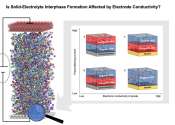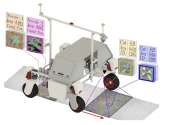Musk says X will scrap 'block' feature
Elon Musk said Friday his social media company X would scrap a feature that allows users to block posts from specific accounts.
Aug 20, 2023
2
1
Business

Elon Musk said Friday his social media company X would scrap a feature that allows users to block posts from specific accounts.
Aug 20, 2023
2
1
Machine learning & AI

The Associated Press has issued guidelines on artificial intelligence, saying the tool cannot be used to create publishable content and images for the news service while encouraging staff members to become familiar with the ...
Aug 17, 2023
0
14
Engineering

Indoor air pollution may have met its match. Today, scientists will report that they have designed catalyst-coated lampshades that transform indoor air pollutants into harmless compounds. The lampshades work with halogen ...
Aug 16, 2023
0
75
Energy & Green Tech

In countries such as Peru, Bolivia and Chile, it's not uncommon for people who live in foggy areas to hang up nets to catch droplets of water. The same is true of Morocco and Oman. These droplets then trickle down the mesh ...
Aug 16, 2023
0
25
Energy & Green Tech

Batteries are devices that store and release energy by moving charged particles called ions between two materials called electrodes. The electrodes are separated by a liquid or gel called an electrolyte, which contains ions ...
Internet

A federal court judge this week shot down Google's attempt to scuttle a multi-billion-dollar class-action lawsuit accusing it of making an Orwellian grab of "potentially embarrassing" data from users' "Incognito mode" and ...
Aug 11, 2023
1
37
Internet

Artificial intelligence firms must ask for permission before using copyrighted text and images to generate content, a consortium of news groups said on Wednesday.
Aug 9, 2023
0
38
Consumer & Gadgets

Some employers are excited about swapping out computer monitors for virtual reality headsets, but the side effects of using VR are not completely understood. In a recent study, my colleagues and I propose 90 factors that ...
Aug 9, 2023
0
3
Robotics

Over the past decade, robotic systems have revolutionized numerous sectors, including the agricultural and farming sector. Many tasks that were traditionally performed manually can now be potentially automated, boosting efficiency ...
Energy & Green Tech

Due to the environmental and energy problems caused by fossil fuels, the search for alternative clean and renewable energy solutions has never been more urgent. Among these, hydrogen (H2) is emerging as a leading contender ...
Aug 8, 2023
0
4
In biology, an organism is any living system (such as animal, plant, fungus, or micro-organism). In at least some form, all organisms are capable of response to stimuli, reproduction, growth and development, and maintenance of homeostasis as a stable whole. An organism may either be unicellular (single-celled) or be composed of, as in humans, many billions of cells grouped into specialized tissues and organs. The term multicellular (many-celled) describes any organism made up of more than one cell.
The terms "organism" (Greek ὀργανισμός - organismos, from Ancient Greek ὄργανον - organon "organ, instrument, tool") first appeared in the English language in 1701 and took on its current definition by 1834 (Oxford English Dictionary).
Scientific classification in biology considers organisms synonymous with life on Earth. Based on cell type, organisms may be divided into the prokaryotic and eukaryotic groups. The prokaryotes represent two separate domains, the Bacteria and Archaea. Eukaryotic organisms, with a membrane-bounded cell nucleus, also contain organelles, namely mitochondria and (in plants) plastids, generally considered to be derived from endosymbiotic bacteria. Fungi, animals and plants are examples of species that are eukaryotes.
More recently a clade, Neomura, has been proposed, which groups together the Archaea and Eukarya. Neomura is thought to have evolved from Bacteria, more specifically from Actinobacteria.
This text uses material from Wikipedia, licensed under CC BY-SA